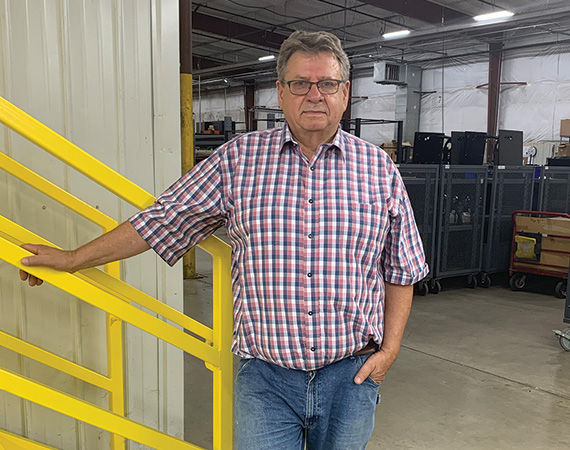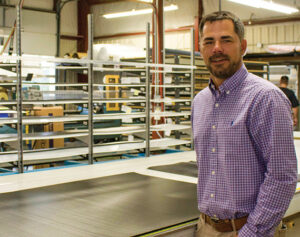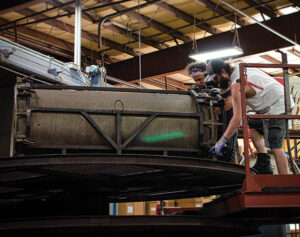Armed with little more than a $1,500 bank loan — secured by his car — entrepreneur Ken Detloff founded Kenway Engineering in 1981, growing it into a formidable employer in Fairmont, Minn.
Today, Kenway is a 20-person company that manufactures heating and air conditioning for offroad and construction vehicles worldwide.
Detloff founded the company to capitalize on the upgrades local counties were making to their motor graders, which included needing new air conditioners. In the days before email lists, Detloff opened a road atlas, gathered a list of counties across the Midwest, and mailed a letter to the county highway engineer of each.
He expanded his company by offering heating and cooling systems for a wider range of equipment types. Kenway worked with companies like Ziegler CAT on excavators and front-end loaders. It also accepted specialty manufacturing jobs, building parts for other manufacturing companies.
Kenway initially outsourced things such as sheet metal work, but over time brought more work in house. It added welding equipment and CNC machining — an automated machine control process. The company also started selling as an original equipment manufacturer (OEM) and, thanks to improvements in facilities and technology, expanded its sales to field sprayers for Hagie Manufacturing and construction cranes for Terex Corporation.
But this rapid growth, combined with the 2008 recession, also posed challenges.
“We knew that if we were to grow the business and attract new customers, we had to show them that we can be receptive and actually manage problems within our organization,” says Detloff.
Saving space, streamlining production
Since then, Detloff has transformed his company by doubling down on continuous improvement, solidifying its identity as both an OEM and a specialty machine shop. Its ISO certification enabled Kenway to keep a major client onboard and attract new ones.
As part of helping the vision, mission and values within Kenway Engineering, Enterprise Minnesota proposed using Lean Thinking to support two main opportunities for Kenway: value stream mapping and enhanced employee training in lean.
Through the value stream mapping process, a consultant facilitated a team of employees to map the flow of the facility — from the receipt of raw material to shipping off the final product. One of Kenway’s sticking points, they found, was moving parts through the various fabrication departments.
“The problems were all symptoms of traditional manufacturing thinking that doesn’t emphasize flow,” says Greg Langfield, a business growth consultant at Enterprise Minnesota.
The solution? Creating a cart system to keep parts organized, as sorting the products into carts makes them easier to move around and separate by type of material. This was a breakthrough, according to Langfield, who worked with Kenway. The team could build the carts themselves, customizing them to the product involved. The process reduced the time needed to move things across the floor and allowed greater flexibility in sorting, speeding up production.
Another of Lean Thinking solutions was to simplify Kenway’s system for managing material drops, which is the unused material left over from using bar stock. These drops were placed on a pallet with the goal of having an employee use this material first before consuming a stock length. Unfortunately, what was an idea full of good intentions resulted in an overflowing heap of various materials. Workers, pressed for time, would often grab new pieces of material rather than checking the pallet, which meant more drop material piling up that took up valuable floor space.
Under the microscope of Lean Thinking, however, Kenway realized that this floor clutter cost the company more money in space and efficiency than material saved. By setting a limit on how much drop material employees should save along with establishing an organized storage system, Kenway could use that newly created space to grow the business. This Lean Thinking approach was based on the 5S principles of workplace organization: Sort, Set in Order, Shine, Standardize and Sustain.
Langfield worked with Kenway to apply lean 5S principles elsewhere throughout the facility, from the laser cutting paint area to the finished goods area. Through a series of Kaizen events, employees learned the 5S principles and applied their individual ingenuity to come up with these solutions on their own. Even smaller changes, like maintaining a systematic, organized workspace, go a long way.
The employee-driven nature of these processes has helped keep the momentum going. These methods are still in place today, says Detloff, and the company has benefited from its culture of continuous improvement.
“He’s a very strategic thinker,” says Langfield of Detloff, “so it was nice to be able to show him how continuous improvement could align with his original strategy of being an OEM but also being a job shop.”
A legacy of growth
As business grew, Kenway caught the eye of Sanz Clima, a Spain-based manufacturer of heating and cooling systems for buses, trains, and other large public transportation vehicles. The company has subsidiaries in Russia, Poland, Mexico, Brazil and more.
In late 2019, Sanz Clima visited 20 businesses in the United States in the hope of growing its American market. Out of those 20, Sanz Clima chose Kenway, and in October of that year, Detloff sold the company.
For Detloff, the sale represented a natural evolution of Kenway Engineering. He turned down other offers that would have moved operations out of state, which he says didn’t feel right. What felt right was a family-owned business like Sanz Clima, which is currently run by a sibling team who took over from their parents, the founders.
Detloff feels confident they will maintain a growth-oriented approach while keeping jobs in Fairmont — and even adding new jobs too. And Sanz Clima wanted Detloff to stay on a few years past the sale as the bridge between old and new leadership.
“It’s great that the company can go beyond me. All of our employees were able to stay here, and we’re still part of our neighborhood, our Fairmont community,” says Detloff, who plans to retire within two years.
‘They’re totally amazed’
Between the sale and his company’s enhanced processes, Detloff expects Kenway Engineering to double in size in the next five years.
During spring 2020, Kenway’s revenue took a hit due to the economic slowdown resulting from COVID-19. Orders slowed to a crawl in April and May as states and nations entered lockdown periods. But business soon bounced back, and in the end, 2020 was one of Kenway’s best years on record.
Now, the company is undergoing a period of change, selling off its machining centers to make room for more assembly. The facility currently looks like Kenway is moving out, but in reality, it’s an in-between stage on the path to something new. It’s keeping sheet metal manufacturing in-house, but with the free space it will launch a new product line of HVAC for buses and other mass transportation vehicles for companies in Montreal and the Midwest.
According to Detloff, Kenway produces more revenue per employee than Sanz Clima’s other subsidiaries. It’s a distinction he owes to Lean Thinking among his employees, not just lean processes on the manufacturing floor.
When one person with a specialized job calls in sick, that part of the process doesn’t have to pause for the day. Instead, Kenway’s employees undergo cross-training. One employee might learn skills at the press braking, painting, and assembly stations to accommodate that day’s needs even if absences happen.
“I want people to be proud of their area. I want them to be masters of everything they do out there,” says Detloff.
It’s a modern company culture that’s equipped for success long after Detloff retires.
“When I give people tours and I show them how our product runs through the factory, they’re totally amazed,” he says.
…
Featured story in the Fall 2021 issue of Enterprise Minnesota magazine.


